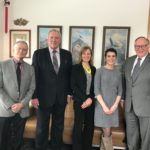Dear Friends,
This Friday, April 20 marks the final committee deadline of the session, meaning most bills must have made it through the committee process by the end of the day. Certain finance, tax, and capital investment bills are exempt from this deadline. Over the next week, expect to hear more information on the Senate proposals for bonding, school safety, how to conform Minnesota’s tax system with federal tax law, and more. There is just over one month remaining in the legislative session before the constitutionally-mandated adjournment date of May 21.
Capital Investment Committee
The Senate Capital Investment Committee, which I chair, began holding regular meetings over the last week to examine projects across Minnesota seeking bonding funds. In January and February, the committee traveled across the state to visit project sites and hear from stakeholders and these committee hearings are meant to supplement that bonding tour. Over the next week, I will be working with my Senate colleagues, the House of Representatives, and the governor’s office to find common ground on a bonding proposal that meets the needs of Minnesotans across the state. I expect this bonding bill to include projects largely related to critical infrastructure, roads and bridges, mental health, and the preservation of previous state investments like college campuses. I will keep you posted.
Legislation passed
While bills are still rapidly moving through the committee process, the Senate did pass a few bills off the Senate floor this week. The bills we passed includes legislation to change to the existing biodiesel blending mandate to allow for a ramp-up period to reach seasonal mandates. Many in rural Minnesota have difficulty reaching the state’s biodiesel mandate during the winter due to the different blend used. As such, this bill creates an exemption for the first two weeks in April – meaning in each year that the seasonal reduction to five percent is in effect, the minimum content level of diesel fuel sold or offered for sale in Minnesota may be less than the level required – currently 20 percent – but not less than 10 percent.
The other bills that were passed include:
- SF 2484 – Honoring fallen Wayzata officer Bill Mathews by making U.S. Highway 12 a memorial highway.
- HF 2764 – Technical changes relating to the domestication and conversion of corporations, nonprofit corporations, limited liability companies, limited partnerships, and partnerships.
- HF 3157 – Creates new criminal penalties for individuals found guilty of misrepresenting their pet as a service animal.
- SF 3466 – Allows motorcycle permit holders to travel freely on interstate highways.
- HF 3158 – Requires one hour of continuing education on Minnesota state law and rules for mortgage loan officers.
What’s to come?
Expect proposals related to tax conformity, capital investment, curbing the opioid epidemic, childcare availability, and more to be released over the next week. With one month remaining in session, we are optimistic we will be able to adjourn the session with these issues taken care of in a timely manner.
Childcare is an issue that remains a priority for me. With the news of additional funds coming from the federal government for childcare, I am continuing to visit with state health and human services officials – as well as the health and human services legislative committee chairs – about a prioritization of those funds to deal with some of the barriers facing providers, including continuing education, licensing discrepancies, and business plan development. We also continue to have conversations on some of the undue requirements for childcare providers, the inconsistent enforcement of those requirements, and the great need for variances – all significant issues facing our rural communities and exacerbating the childcare shortage we’re seeing today in Greater Minnesota.










